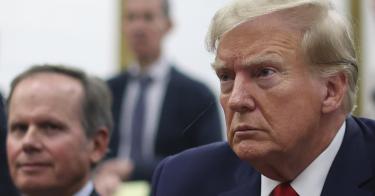The Supreme Court should reject special counsel Jack Smith’s latest ploy to short-circuit the 2024 election.
Smith petitioned the Supreme Court this week to intervene prematurely in the trial proceedings against Donald Trump.
Smith charged Trump in August with attempting Jan. 6, 2021, to block the peaceful transfer of power.
He alleged Trump defrauded the United States, obstructed Congress and deprived voters of their constitutional rights in his efforts to persuade Vice President Mike Pence to suspend the electoral-vote count and in giving an inflammatory speech before a crowd that then attacked the Capitol.
Federal District Court Judge Tanya Chutkan scheduled the trial to begin March 4, 2024, one day before the Super Tuesday primaries.
In response, Trump claimed that as president, he enjoyed immunity from criminal prosecution when acting at the “outer perimeter” of his official responsibilities.
He also raised a second defense: that he cannot be prosecuted for the same conduct for which he was impeached by the House and acquitted by the Senate.
>>> Don’t Let Guilty Pleas in Trump Indictment in Georgia Fool You
Chutkan rejected that claim.
In the regular course of criminal proceedings, which apply to 99.9999% of all cases, Trump would have the right to appeal to the DC Circuit, often described as the second-most-important court in the land, and then petition the Supreme Court.
But rather than allow normal procedures to run, Smith has filed a self-described “extraordinary request” urging the Supreme Court to bypass the appeals court and immediately review Trump’s immunity claim—a tactic unseen since the Nixon Watergate Tapes case, to which Smith compared Trump’s prosecution.
Smith’s petition seeks to embroil the justices in the Trump trials and double down on the politicization of their timing.
There is no doubt the question at stake—did President Trump’s conduct after the election and culminating on Jan. 6 fall within the scope of his official powers or did it amount to a crime?—is of vital importance.
Should the Supreme Court decide this issue, which might normally take a year or two, the opinion would become one of the most important ever on the presidency and the Constitution’s separation of powers.
But the special counsel nowhere explains why this case should leapfrog the D.C. federal appeals court, which regularly resolves controversies over the executive branch, the separations of powers and even immunity.
The justices would benefit from a careful opinion from the lower appeals court, just as it does in virtually every case it hears.
Smith says it’s of “paramount” and “imperative” importance these matters be resolved quickly.
But he nowhere explains the need for speed.
Smith’s bull rush only makes sense as an effort to get to trial before the election.
Smith knows any appeal will delay the trial because all proceedings effectively halt during the pendency of this appeal, as Judge Chutkan recognized Wednesday when she granted Trump’s motion to suspend the trial.
If he can persuade the high court to pluck the case prematurely from the lower courts, it might issue a decision within two to three months (as the Watergate Tapes court did in 1974), start a trial by the early summer and reach a verdict smack in the middle (conveniently for Smith) of the presidential election.
But if the justices allow the Trump immunity issue to proceed normally, a verdict would be unlikely until after the November elections.
Prosecutors should not pursue cases that will directly affect federal elections, but that would be unavoidable if Smith has his way.
Trump remains the presumptive frontrunner for the Republican nomination and voting will start soon with the Iowa caucus in January.
There is broad dissatisfaction with President Biden and widespread concern about his advanced age, and the latest swing-state polls indicate Biden is falling behind Trump.
With the trial dates of the other three pending criminal cases against Trump up in the air, Smith seems desperate to get to trial—the one most likely to capture the public’s attention.
He would like to see Trump a convicted felon, perhaps sitting in a prison cell, by Election Day.
If Smith cannot move forward soon, Trump might even be free to campaign rather than sit in courtrooms.
Smith’s tactics, however, may backfire.
Every time Trump gets indicted or suffers a legal setback, his poll numbers rise.
>>> Federal Indictment of Donald Trump Is Weaponization of American Political System
Trump has effectively convinced broad swaths of the public he is being singled out for attack because of who he is and who he represents.
Nothing in the Constitution prohibits a convicted felon from running for or serving as president.
His supporters are crying “election interference” on the ground the Biden Justice Department is trying to imprison Biden’s primary political opponent.
Those who accused Trump of politicizing the Justice Department to investigate Joe and Hunter Biden’s influence-peddling schemes are sitting on the sidelines while Trump faces multiple prosecutions by his opponent’s DOJ.
The larger point: Neither the special counsel nor Judge Chutkan, who has set an unreasonable trial schedule, trust the American people to decide for themselves whether Trump violated his duty Jan. 6.
Instead of allowing Americans to render their verdict at the ballot box, they want to decide Trump’s fitness for office in the courtroom.
The Supreme Court can pull the courts and prosecutors out of politics, make a stand for fairly applying the law and defend our institutions by rejecting Smith and his emergency appeal.
This piece originally appeared in the New York Post




